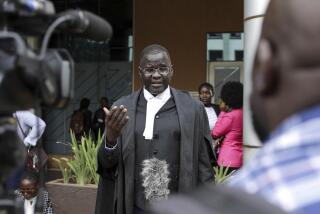South Africa’s tribal system strips rural women of rights
KWAMPUNGOSE, South Africa — As a child, Nike Dlamini grew up under a rule: If anything happened in the family or the village, you went straight to the head man. Quarrels, problems, births, deaths: All had to be reported. In some cases — a child born out of wedlock — there was a fine to be paid.
When Dlamini was 11, her older brother made sexual advances, forcing her to undress and stroking her. Dlamini and her sisters went to the head man, the village representative of the traditional king, or chief, for help.
He brushed it off as a family affair, she said. Male relatives took her brother’s side, and Dlamini fled to avoid what she feared would inevitably be rape.
After two decades away, Dlamini, 32, came home last year to this village in the eastern province of KwaZulu-Natal. She approached the head man asking for land to build a house with her savings where she could raise her two children.
“He said he’s not allowed to allocate land to a woman,” she said. “It must be a male relative.”
South Africa’s system of traditional rulers and tribal courts endures, and the ruling African National Congress moved recently to widen the reach of that system. The Tribal Courts Bill would subject 20 million rural South Africans to courts ruled by traditional chiefs, in a move critics say creates one law for urban people and another for those in tribal areas.
The bill would deny South Africans in tribal areas their present right to opt out of traditional courts in favor of government courts. Although serious criminal offenses would still be heard in conventional courts, some assaults, including cases of domestic violence, could be heard in tribal courts.
“The tribal courts remain patriarchal institutions. Women complain that when they try to bring their cases to councils comprised of men — and old men at that — they don’t get a very sympathetic hearing, particularly when it comes to family matters,” said Sindiso Mnisi Weeks, senior researcher at the Law, Race and Gender Research Unit at the University of Cape Town.
The tribal traditions and institutions sit uneasily alongside a liberal constitution outlawing discrimination on the basis of sex, race, religion or sexual preference.
Nursing grievances against arbitrary chiefs and traditional courts that treat them as second-class citizens, women have emerged with horror stories: chiefs who refuse grieving widows the right to appear in conventional courts when their land and houses are stolen; who collect arbitrary taxes or impose harsh fines; who punish them by refusing to let them bury their dead.
***
Talking about her experiences 21 years later, Dlamini stood in the doorway of her unfinished house, which she hasn’t the money to complete. Tears threatened, but she brushed them away, engulfed by memories.
Suddenly she crashed, face first, to the concrete floor of the round thatched hut in a faint. After a minute, she regained consciousness. She said she had been suppressing so much grief and anger that she feared she would explode.
Her older child returned from school, folded his uniform reverently and took a bowl of samp (coarse cornmeal) and beans from a pot on the stove. Dlamini has managed to put a roof over their heads, but she’s afraid they’ll be turned out one day, because the land isn’t hers.
Although the South African Constitution guarantees equal rights to all, the head man forced her to put the land in her cousin’s name, even though she paid the $190 fee to the chief for the land. But she frets that the cousin will change his mind, or that his family will take the land if he dies.
“I’m very worried about it,” she said. “I’m thinking about my children in particular, because they might come and grab the land and my children will be homeless.”
When Dlamini returned to her village, unmarried but with two children, the head man also demanded a $50 fine to be paid to the chief for the children born out of wedlock.
“Where am I going to get this money when I don’t even have money for food?” she said.
The fines for out-of-wedlock births are traditionally intended to “cleanse” the chiefs, but the men also often impose levies to pay for their sons’ educations, a new car or other expenses, said activist Sizani Ngubane of the Rural Women’s Movement. She said that with most rural people unemployed, families were sometimes forced to use welfare payments, the $31 monthly child support grant paid by the government, for the fines and levies, which are illegal.
Chiefs keep a register of the unpaid levies. Those who can’t pay get punished, sooner or later. A chief can paralyze an unruly subject simply by denying the “proof of address” letter that rural villagers need to get an ID or passport, open a bank account, receive welfare payments and access government services. But retribution can be more sinister.
Nokwazi Mkhize’s family, also from KwaMpungose, failed to “cleanse” the chief by paying a fine when a son was born to her sister out of wedlock in 1992. In 1999, the boy died, and the chief refused the family permission to bury him. It took a week to borrow the money, said Mkhize, 38, her anger still burning 13 years later.
“In my whole life, nothing upset me as much as that individual [the chief] telling me I can’t bury the body of the little one, just because he wants his money,” she said.
In Ntandakuwela, the next village, 57-year-old Jabulisile Sikhakhane sat on a thin mat on the concrete floor of her home, her back ramrod straight. When her husband, a member of the chief’s family, died three years ago, her husband’s brother took all her land, her house and her cattle.
“He took everything. When I tried to speak about it, I wasn’t allowed to speak directly to men because I was in mourning dress.” (Women in mourning are regarded as unclean in traditional culture.)
Traditional courts demand that male relatives — often the very people who have seized the land — speak for women in mourning. Sikhakhane felt powerless, with no one to stand up for her.
“I’ve been stripped of everything. I don’t have a thing now. My land, all of it is gone. It makes me feel very bad because I would have used those cattle to raise my kids.”
***
Critics see the ANC’s role in pushing the courts bill as a bid to shore up rural support. Feminist researcher and writer Nomboniso Gasa said politicians were exploiting conservative prejudices, while traditional leaders wanted to extend their powers.
“This is not really in the name of culture because it has got very little to do with that. It has got to do with power-broking, and not for the benefit of anyone but themselves,” she said.
At a March panel discussion at the University of Cape Town, Phathekile Holomisa, an ANC lawmaker and head of the Congress of Traditional Leaders of South Africa, said that unlike other forms of justice, traditional courts weren’t “alienating” to rural people.
“Traditional leadership in those places is the last of the institutions that are actually African, that have not yet been corrupted by foreign elements, value systems and so on. So it’s up to you, therefore, you as well as everybody who’s in South Africa, to decide whether you want to obliterate even the last of the vestiges of anything that is African in the name of the new order,” he told the audience.
To tribal leaders, the bill’s critics might seem unruly, even disrespectful. But rural women are suddenly expressing opinions that not so long ago would have been unthinkable.
“Why must I be represented [in a tribal court] by a male relative?” said a deeply indignant Sikhakhane. “I want to speak to the chief face to face and look at him like I am looking at you now and empty my heart like I am speaking to you now.
“I don’t want to be represented by someone who can’t get into my shoes, who doesn’t know how I feel. I want to represent myself.”
More to Read
Start your day right
Sign up for Essential California for news, features and recommendations from the L.A. Times and beyond in your inbox six days a week.
You may occasionally receive promotional content from the Los Angeles Times.






